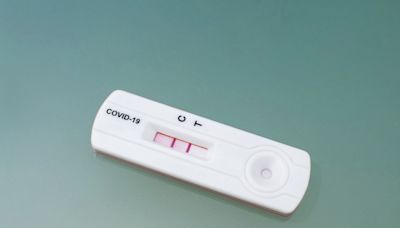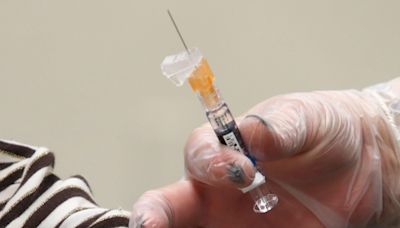Search results
Mar 14, 2024 · Some people who have been infected with the virus that causes COVID-19 can experience long-term effects from their infection, known as Long COVID or Post-COVID Conditions (PCC). Long COVID is broadly defined as signs, symptoms, and conditions that continue or develop after acute COVID-19 infection. This definition of Long COVID was developed by ...
- Patient Appointment Tips
Prepare a brief history that summarizes your experience with...
- Caring for People With Post-COVID Conditions
If you care for someone with Long COVID, remember to take...
- Myalgic Encephalomyelitis/Chronic Fatigue Syndrome (Me/Cfs)
Object Moved This document may be found here
- Testing
A positive COVID-19 test means the virus was detected and...
- Symptoms of Coronavirus
Flu and COVID-19 share many characteristics, but there are...
- Patient Appointment Tips
- Overview
- Symptoms
- Causes
- Risk Factors
- Complications
- Prevention
COVID-19, also called coronavirus disease 2019, is an illness caused by a virus. The virus is called severe acute respiratory syndrome coronavirus 2, or more commonly, SARS-CoV-2. It started spreading at the end of 2019 and became a pandemic disease in 2020. The virus that causes COVID-19 spreads most commonly through the air in tiny droplets of fl...
Typical COVID-19symptoms often show up 2 to 14 days after contact with the virus. Symptoms can include: 1. Dry cough. 2. Shortness of breath. 3. Loss of taste or smell. 4. Extreme tiredness, called fatigue. 5. Digestive symptoms such as upset stomach, vomiting or loose stools, called diarrhea. 6. Pain, such as headaches and body or muscle aches. 7....
COVID-19is caused by infection with the severe acute respiratory syndrome coronavirus 2, also called SARS-CoV-2. The coronavirus spreads mainly from person to person, even from someone who is infected but has no symptoms. When people with COVID-19 cough, sneeze, breathe, sing or talk, their breath may be infected with the COVID-19virus. The coronav...
The main risk factors for COVID-19are: 1. If someone you live with has COVID-19. 2. If you spend time in places with poor air flow and a higher number of people when the virus is spreading. 3. If you spend more than 30 minutes in close contact with someone who has COVID-19. Many factors affect your risk of catching the virus that causes COVID-19. H...
Complications of COVID-19include long-term loss of taste and smell, skin rashes, and sores. The illness can cause trouble breathing or pneumonia. Medical issues a person already manages may get worse. Complications of severe COVID-19illness can include: 1. Acute respiratory distress syndrome, when the body's organs do not get enough oxygen. 2. Shoc...
The Centers for Disease Control and Prevention (CDC) recommends a COVID-19 vaccine for everyone age 6 months and older. The COVID-19 vaccine can lower the risk of death or serious illness caused by COVID-19. It lowers your risk and lowers the risk that you may spread it to people around you. The COVID-19vaccines available in the United States are: ...
Sep 9, 2021 · Among those who ever experienced any long-term symptoms, more respondents who received a positive test result than those who received a negative test result reported that having long-term symptoms motivated them to receive or consider receiving a COVID-19 vaccine (11.0% versus 7.0%) and believed that receiving the vaccine made their long-term ...
- Valentine Wanga, Jennifer R Chevinsky, Lina V Dimitrov, Megan E Gerdes, Geoffrey P Whitfield, Robert...
- 2021
Kids have many of the same COVID-19 symptoms as adults, but they tend to be milder. ... The CDC states that well-fitting respirator masks (like N95s and KN95s) give better protection than cloth masks.
- Cancer. Having cancer can make you more likely to get very sick from COVID-19. Treatments for many types of cancer can weaken your body’s ability to fight off disease.
- Chronic kidney disease. Having chronic kidney disease of any stage can make you more likely to get very sick from COVID-19. Get more information: Chronic Kidney Disease.
- Chronic liver disease. Having chronic liver disease can make you more likely to get very sick from COVID-19. Chronic liver disease can include alcohol-related liver disease, non-alcoholic fatty liver disease, autoimmune hepatitis, and cirrhosis (or scarring of the liver).
- Chronic lung diseases. Having a chronic lung disease can make you more likely to get very sick from COVID-19. Chronic lung diseases can include: Asthma, if it’s moderate to severe.
Muscle or body aches. Sore throat. New loss of taste or smell. Diarrhea. Headache. Fatigue. Nausea or vomiting. Congestion or runny nose. Some of these symptoms are very common and can occur due to many conditions other than COVID-19, the disease caused by the coronavirus called SARS CoV-2.




